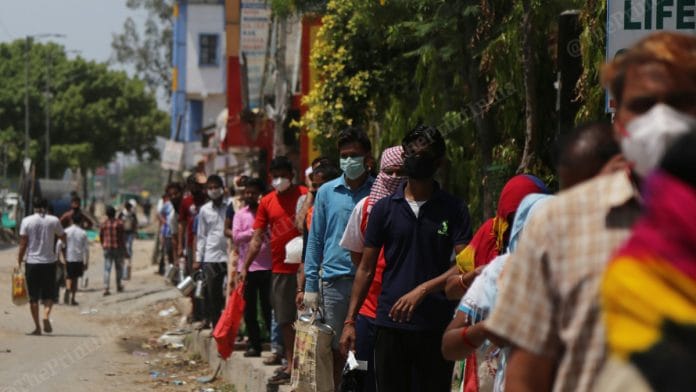How do you make data-driven decisions when the data are bad? This is the Covid-inspired question that’s been running through my mind the past three months in semi-seclusion.
It’s become even more urgent as lockdowns have eased. When I was just staying at home, the only choice I had to make was which jigsaw puzzle to start. Now, it seems each of us has to figure out our own plans for getting haircuts, visiting our parents, figuring out childcare. The U.S. feels as if it’s expanding from 50 different Covid-19 plans to 328 million plans. Most of us aren’t scientists, and there’s still so much about this virus even scientists just don’t know.
It’s not just that the data aren’t good, says Emily Oster, an economist at Brown University who recently launched a website called Covid Explained to help the public make informed choices. “We just don’t have even very basic summary statistics about some of these things. I’m used to grappling with, ‘OK, I’m not sure about the causality here, let’s really dig into how this has been constructed.’ But I’m not used to dealing with things where I don’t know the mean.” Oster has written two bestsellers, “Expect Better” and “Cribsheet,” on making parenting decisions with sometimes conflicting data; hearing her say this is at once reassuring and alarming. Even the professionals need time to sort out data that is missing, muddled, or somewhere in between.
If “listen to the experts” and “follow the science” are your usual mantras, you can be forgiven for feeling a bit like a weathervane. In February, I was totally unconcerned about getting on an airplane. In March, I was afraid to go to the park. “It’s amazing how quickly it moved from ‘OK, let’s not shake hands and do an elbow bump to ‘Never leave your house again!’” says Oster.
It’s unmooring in a world where we’re used to having scads of data at our fingertips. Normally, we’re drowning in data, says Harvard lecturer and risk consultant Vikram Mansharamani. “As a result, we have come to believe that there is an optimal, correct, maximized solution to our predicament. We think there is a correct answer.”
Mansharamani is the author of “Think for Yourself: Restoring Common Sense in an Age of Experts and Artificial Intelligence.” Even when we have a lot of data, he says, it can give us a false sense of security, because “oftentimes there’s data that can support multiple views.” With Covid, it’s just that much more obvious.
Also read: There’s a rush for Covid medical insurance but the cover comes with a catch
Even so, a consensus on how the virus spreads is emerging, and that can help us divide certain activities into relative risk categories. Higher risk are activities that involve big crowds, being indoors with other people, shouting or singing, prolonged contact with others, and not wearing a mask. Lower risk are those done alone or in small groups, outdoors, with fleeting contact, or masked. Still, there are judgment calls to make. What’s a “small” group? What if you’re shouting with a mask on?
We can increase our chances of making good decisions by keeping a few principles in mind. For one, beware of reacting to the last bit of evidence that comes in. This is called “recency bias,” Oster says, and it’s not a good thing. “Every time you see a piece of new data, take a step back and think about what came before this. How good is this information, and what else do we know?”
Also watch out for confirmation bias, where you cherry-pick the data points that give you permission to do the thing you want to do, says Mansharamani. “Play devil’s advocate with yourself and your own decisions,” he suggests. “Ask what will happen if you take action or don’t take action.”
If you want to do something and you’re not sure if it’s safe, weigh the benefits against the risks, Oster advises, and look for alternatives where you can. Some things — sending kids to school, for instance — have lots of benefits, and relatively few alternatives. Others — going out to a loud bar where people will be shouting and you can’t wear a mask and drink at the same time — have relatively few benefits and lots of alternatives.
If you make a decision and then want to change your mind, ask what’s changed. Reliable new information should guide your behavior. For example, I was hesitant to go back to the hairdresser when I learned that two Covid-positive stylists had exposed 140 customers — but I felt much more confident when, two weeks later, zero had tested positive. (All had worn masks.) I booked an appointment for a trim the next day.
Some decisions can be safely delayed. I’m usually the person who can tell you in February what I’ll be doing in August, but that’s a level of planning I’ve just had to let go of in 2020. Businesses and universities may have to decide what they’re doing months from now, but I don’t.
It’s not comfortable, but it’s where we are. And in truth, we have to make decisions based on incomplete data all the time. The stakes just don’t usually feel this high.-Bloomberg
Also read: Public lockdown discipline fast eroding, India risks becoming lax in Covid fight






